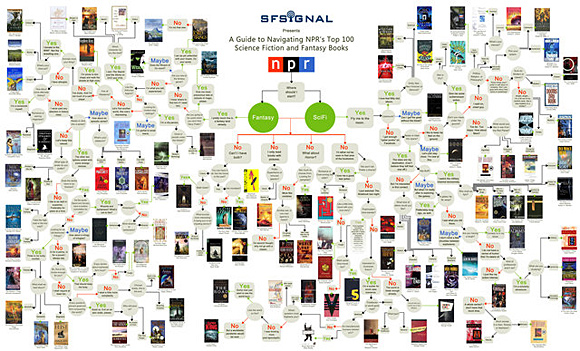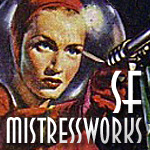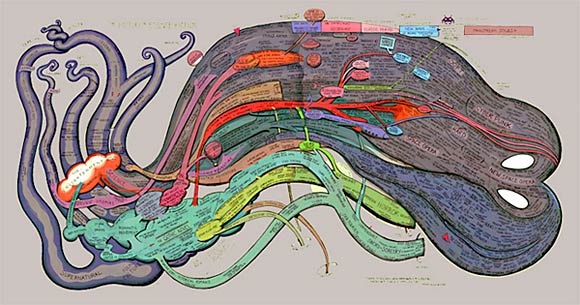OffWorld SF Reading Group
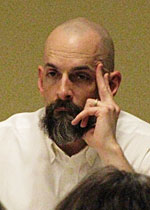 OffWorld is a new science fiction reading group sponsored by WordSpace, a literary organization based in Dallas, Texas. Rather than taking the traditional book club route and reading a single book per month, we are choosing an author to read and discuss over a four-month period. We’ll be meeting as a group locally for discussion, to watch author videos and, from time to time, we’ll bring in outside speakers in addition to holding forum discussions here on WWEnd. If you are in the Dallas area, we would love to have you join in our regular meetings, but it’s with these forum discussions that we hope to bring in as many different voices and opinions as possible.
OffWorld is a new science fiction reading group sponsored by WordSpace, a literary organization based in Dallas, Texas. Rather than taking the traditional book club route and reading a single book per month, we are choosing an author to read and discuss over a four-month period. We’ll be meeting as a group locally for discussion, to watch author videos and, from time to time, we’ll bring in outside speakers in addition to holding forum discussions here on WWEnd. If you are in the Dallas area, we would love to have you join in our regular meetings, but it’s with these forum discussions that we hope to bring in as many different voices and opinions as possible.
Our first author is Neal Stephenson. We are setting up discussions on the books we know members are reading, but feel free to request that we add any book that you have read and would like to discuss. You can also follow our postings on the WordSpace Blog. There we will have links to Neal Stephenson material on the web as well as updates about events in Dallas. Search for OffWorld in the list of topics for all related postings.
How the Angels See the Universe
Be sure to watch it in HD! Here’s the video description on YouTube:
This animated flight through the universe was made by Miguel Aragon of Johns Hopkins University with Mark Subbarao of the Adler Planetarium and Alex Szalay of Johns Hopkins. There are close to 400,000 galaxies in the animation, with images of the actual galaxies in these positions (or in some cases their near cousins in type) derived from the Sloan Digital Sky Survey (SDSS) Data Release 7. Vast as this slice of the universe seems, its most distant reach is to redshift 0.1, corresponding to roughly 1.3 billion light years from Earth. SDSS Data Release 9 from the Baryon Oscillation Spectroscopic Survey (BOSS), led by Berkeley Lab scientists, includes spectroscopic data for well over half a million galaxies at redshifts up to 0.8 — roughly 7 billion light years distant — and over a hundred thousand quasars to redshift 3.0 and beyond.
For more information about BOSS and the latest data release, go to http://newscenter.lbl.gov/news-releases/2012/08/08/boss-sdss-dr9/.
CLANG!
Check out this awesome Kickstarter project headed up by famed SF authors Neal Stephenson and Greg Bear. Their goal is to raise $500K to fund a new interactive sword fighting video game. From Neal’s intro:
In the last couple of years, affordable new gear has come on the market that makes it possible to move, and control a swordfighter’s actions, in a much more intuitive way than pulling a plastic trigger or pounding a key on a keyboard. So it’s time to step back, dump the tired conventions that have grown up around trigger-based sword games, and build something that will enable players to inhabit the mind, body, and world of a real swordfighter.
Sounds like the kind of project WWEnders can appreciate. What do you think? Is it time to pledge?
Review: The Warded Man by Peter V. Brett
Guest Blogger and WWEnd Member, Matt W. (Mattastrophic), reviews science fiction and fantasy books on his blog Strange Telemetry. Matt is a regular WWEnd contributor and he won the January GMRC Review of the Month for his review of The Dispossessed. Check out his profile page for more great reviews or visit his blog and let him know you found him here.
Note: The Warded Man is published in the UK as The Painted Man.
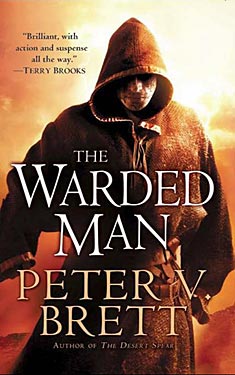 The demons rise every night without fail, and every night a few more humans are viciously killed. The only thing that can hold them at bay are the magical wards people put around their homes, and within which they huddle together at night, trying to ignore the sounds of the monsters outside constantly looking for a way in. Some of them find it. When the corelings–demons of fire, rock, air,water, sand, and rot–first rose, they massacred humans close to the point of extinction. Then mankind discovered the magical combat wards that allowed them to fight the beasts. An unparalleled age of science and progress followed, but safety bred complacency, and when the corelings returned mankind fell into a dark age and lost a great deal of knowledge about the wards. Now, during the day men and women work and check their defensive wards, while at night all they can do is huddle in their homes and hope the defenses will hold and keep the monsters out. Travel between townships is minimal, and few know the world beyond their own hometown. Much has been lost, and much continues to be lost as every night as a few more people succumb to the corelings.
The demons rise every night without fail, and every night a few more humans are viciously killed. The only thing that can hold them at bay are the magical wards people put around their homes, and within which they huddle together at night, trying to ignore the sounds of the monsters outside constantly looking for a way in. Some of them find it. When the corelings–demons of fire, rock, air,water, sand, and rot–first rose, they massacred humans close to the point of extinction. Then mankind discovered the magical combat wards that allowed them to fight the beasts. An unparalleled age of science and progress followed, but safety bred complacency, and when the corelings returned mankind fell into a dark age and lost a great deal of knowledge about the wards. Now, during the day men and women work and check their defensive wards, while at night all they can do is huddle in their homes and hope the defenses will hold and keep the monsters out. Travel between townships is minimal, and few know the world beyond their own hometown. Much has been lost, and much continues to be lost as every night as a few more people succumb to the corelings.
Three young people from different towns in this perilous world set off on paths that will eventually converge, and which may eventually lead them to some measure of hope and salvation for mankind. Arlen is a young boy with a knack for wards who has become sick at everyone’s cowardice and lack of resolve to fight the demons. Leesha is a blossoming young woman with a talent for herb gathering and healing, making her a keeper of some of the oldest surviving tradition, lore, and medicine from the days before the corelings return. But a nasty rumor and a town scandal threatens her. Rojer always wanted to be jongleur, a wandering musician and performer who is the delight of every town he passes through (and who brings rare rays of sunshine and joy into this otherwise bleak world). When demons attack his home and he is horribly maimed, that dream is threatened, but eventually he discovers he has a talent for music that goes beyond mere entertainment. Each has been scarred by the demons, and the book follows their growth from childhood to adulthood.
This is the premise of The Warded Man, by Peter V. Brett, which is yet another book that made me think “fah, what crap” when I first saw it. I guess at the time I was put off by what I have noticed is a pretty formulaic title: The (insert adjective here) Man, as in The Demolished Man, The Illustrated Man, The Female Man, The Invisible Man, The Unincorporated Man, The Thin Man, ad inifinitum. Once I got over my title prejudice and took a close gander at the blurb, I was seized by the interesting premise. It put me to mind of the dark ages following the fall of the Roman Empire, when knowledge was lost and the world grew smaller, darker, and scarier, and having just seen a documentary on the dark ages the premise of this book grabbed me at the right moment. After checking out a few reviews of the book, I decided to give it a shot; I had a spare Audible credit at the time, and I was keeping my expectations flexible. To my surprise, I was really sucked into this book, and once again I found that (ugh) you can’t judge a book by its cover (thank you every elementary school teacher I ever had).
Strong Magic: What The Warded Man Does Well
Brett has stated that he really wanted to write a book about fear and it’s effect on people, and in this YouTube interview he links that desire to his experience with 9/11 and it’s aftermath. The fear angle really comes out in this novel. It is strong in the first thread, Arlen’s, where the young boy learns contempt for his own father’s cowardice before the demons. Much of the worldbuilding Brett does revolves around fear of the corelings and the precautions taken to stay safe from them, which fits since it is a constant, pervasive threat in a similar way fear of terrorism swept the U.S. following 9/11. The night is a time of danger and fear for the people of Brett’s novel, so much so that “night!” has become a curse word. Brett has showed how fear of the corelings has affected everything from architecture and city planning to the way cities and societies have become more insular. Messengers, who travel from town to town bearing supplies and act as diplomats and emissaries, are raised to heroic status for braving the open night between towns with nothing but a portable warding circle between them and the monsters. People have become resigned to living in this world, with only one group, the desert people to the south, actively fighting the monsters. Overall, the atmosphere this creates has an appropriate dark ages feel, similar to what happened after the fall of Rome: technology and knowledge has been lost, and the world suddenly grows a lot smaller and a lot scarier.
The characterization is very good as well. Thankfully, it’s is not filler in between action scenes. The demons are catalysts and background for the tragedies and rites of passage that each character struggles with as they grow up, and their circumstances and character arcs makes them feel like distinct, believable characters. I lost myself (in a good way) in the stories of each of the three viewpoint characters, and even when they were not dealing with the demons their stories were still exciting, tense, and interesting. Will Arlen find a way to fight the demons, or is it only a boy’s fantasy? Can he ever settle for a normal life, one with a wife and children? Will Leesha ever get past the stigma put on her by that nasty rumor, and finally be able to move on with her life? Will she ever be rid of her domineering mother? Will Rojer be able to hang on to his dream of being a jongleur given his maimed hand and his now drunkard of a mentor? Their life experiences feel true to the human condition given such an environment, and like George R. R. Martin’s books (which Brett cites as a major inspiration) the situations they are in frequently offer no easy out or simple moral choice. Each viewpoint character feels well-realized, so that when they eventually come together their relationships with one another is dynamic and interesting.
While the characterization is not just filler between the action, that doesn’t mean that the action is disregarded or underdeveloped. The action works pretty well, especially the climax of the book. There are very few ways to fight the demons, who can shrug off the attacks of most weapons and heal rapidly, so most of the time it’s a desperate struggle for survival and a dash for safety. When a character is caught out at night and trying to find shelter from the monsters, the narrative puts you on the edge of your seat.
Finally, while this book has some very dark places, there is the thread of hope that Brett nurtures along the narrative: hope of turning the tide in the fight against the demons, hope of the people finding courage instead of despair, hope that characters will find their dreams, etc. My one major problem with dystopian or apocalyptic narratives is that the bleakness of them can be a real turnoff. The Warded Man shares elements of the latter genre, although it is squarely fantasy, but thankfully the bleakness does not overwhelm the narrative. Normalcy has a way of asserting itself in the midst of prolonged disaster, and Brett does a good job of showing how each character finds hope and pursues dreams and ambitions both because of and despite the nightly dangers of the demons.
Faded Wards: Where The Warded Man Could Have Been Better
While the fear people feel for the coreligns is very well established in the prose and the interpersonal interactions of characters, the demons themselves failed to dazzle or horrify). The monsters are not particularly well described in the beginning, and while I would certainly not want to be trapped outside with any of them, they didn’t scare me all that much. I kept thinking back to how Jim Butcher describes monsters, how, even when seen full view, I not only had a better idea of what they looked like and what distinguished them, but why they were frightening as well. In most monster stories, the monsters lose some pzzazz after they are revealed in full. Perhaps since Brett was revealing the mosnters very early on, they never seemed very scary. It may also be that they lost some of that oompf by being such a common sight. Still, given that they were so central to the conceit of the novel, I was a bit disappointed in their presentation.
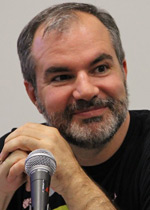 As mentioned earlier, Brett has stated that he really admires George R. R. Martin, and that the moral complexity Martin brings to his characters has caused Brett to really bring up the level of his own writing. Like Martin, the world that Brett creates is filled with ugly, immoral people who will kill you as soon as look at you, but it’s almost too full of those characters. There are characters who help and support the viewpoint characters and characters who are unambiguously bullies or just plain evil, and I didn’t sense that there was a whole lot of a middle ground. The bullies and evil characters are frequently, and obviously, foils for the development of the viewpoint characters, but after a while the presence of a bully/rapist (or would-be rapist)/opportunist who has bad intentions on our main characters stopped being surprising and started feeling like a matter of course. Things start to feel soap-opera-ish at times. While Brett does complicate our view of one bully character greatly in the climax of this book, I sense that I will have to wait until future volumes to see how he wraps up the plot threads of these other characters, so I might just be rescinding this criticism later.
As mentioned earlier, Brett has stated that he really admires George R. R. Martin, and that the moral complexity Martin brings to his characters has caused Brett to really bring up the level of his own writing. Like Martin, the world that Brett creates is filled with ugly, immoral people who will kill you as soon as look at you, but it’s almost too full of those characters. There are characters who help and support the viewpoint characters and characters who are unambiguously bullies or just plain evil, and I didn’t sense that there was a whole lot of a middle ground. The bullies and evil characters are frequently, and obviously, foils for the development of the viewpoint characters, but after a while the presence of a bully/rapist (or would-be rapist)/opportunist who has bad intentions on our main characters stopped being surprising and started feeling like a matter of course. Things start to feel soap-opera-ish at times. While Brett does complicate our view of one bully character greatly in the climax of this book, I sense that I will have to wait until future volumes to see how he wraps up the plot threads of these other characters, so I might just be rescinding this criticism later.
My last criticism comes with a big damn hedging comment attached to it. I found myself wondering about other aspects of the world Brett had built since the worldbuilding only went so far. I imagine if demons started to rise every night in our world, they would take up a lot of our time and consideration, but normalcy and culture find ways of establishing and reestablishing themselves, so I was wondering about other aspects of the world that were not touched on. Of course, this lack of deep worldbuilding can be attributed to the fact that trade and communication is extremely limited by the nightly monster mash, so what would Rojer, Leesha, or Arlen know about far-flung lands? Still, I wanted to see the local culture, government, politics, etc. fleshed out in some more detail.
Concluding Thoughts
Despite some of these criticisms (which I may reverse my opinion on after reading the rest of the series), I enjoyed The Warded Man immensely. I was initially taken in by the central conceit of people barely surviving a nightly onslaught of demons and of kindling the hope to find a way to beat them back, but I stuck with the book for its characters and storytelling. Indeed, I’m pretty invested in Arlen, Leesha, and Rojer, and I really want to see what happens to them next and what happens to the world given the plot events set in motion by the epilogue! As I’ve stated in previous posts, I’m very discerning with what kind of fantasy I read. Perhaps I’m more of a fantasy snob than I am a Science Fiction snob, I don’t know, but I take greater care in picking my fantasy books. I was skeptical about this book, but I found myself hungry for a little fantasy and, given that Scott Lynch’s much-anticipated The Republic of Thieves kept suffering setbacks and that I’m still waiting for Martin’s A Dance with Dragons to come down to a reasonable price ($15 for the ebook from the kindle store? No thank you!) I took a chance on The Warded Man. It not only met and exceeded my standards, but it has put me in the mood to expand my fantasy horizons. I’ve already downloaded the sequel, The Desert Spear, but in between this review and the one for that book I am going to try the first parts of at least two other fantasy series.
In short, I recommend this book enthusiastically and am going to make Brett someone to keep my eye on in the future.
I listened to to this as an unabridged audiobook narrated by Pete Bradbury, whom I was dubious about at first. His somewhat deep voice has a kind of twang (one I can’t quite place) to it that at first didn’t seem to mesh with a fantasy story, but once I got used to it I enjoyed immensely. Come to find out that he has done a few roles on Law and Order and Criminal Intent, which makes me kick myself for not recognizing the book (being the L&O nut that I am).
Killer NPR Top 100 Flowchart from SF Signal
 Last month we posted the NPR: Top 100 Science-Fiction, Fantasy Books list to WWEnd. The list was built from over 5,000 nominations and voted upon by over 60,000 SF/F fans on NPR’s website. The resulting list is an odd one to say the least and has received mixed reviews from fans – both for the books it contains, or does not contain, and for the strange construction of the list.
Last month we posted the NPR: Top 100 Science-Fiction, Fantasy Books list to WWEnd. The list was built from over 5,000 nominations and voted upon by over 60,000 SF/F fans on NPR’s website. The resulting list is an odd one to say the least and has received mixed reviews from fans – both for the books it contains, or does not contain, and for the strange construction of the list.
The list includes entire series counted as one "novel" like the massive 33 volume Xanth Series and the 14 volume Vorkosigan Saga along with a couple incomplete series such as The Kingkiller Chronicles, so far only 2 volumes, and George R. R. Martin‘s A Song of Ice and Fire which currently, and likely for a couple years longer at least, stands at 5 books. There is also the inclusion of the Watchmen and The Sandman comics into a list of best novels to contend with too. I won’t even get into the books and authors that are missing!
Despite some strange choices and other peccadilloes, it’s been the general consensus here at WWEnd, and with many fans that we’ve talked to, that it’s a perfectly fine "fan favorite" list but not really a serious contender for a "best SF/F novels of all time" list. Compare it to a more sober and wider ranging list like Guardian’s Best Science Fiction and Fantasy Novels or The ISFDB Top 100 Books to see what we mean.
The best thing that the NPR list has going for it is the newly minted and extremely geeky awesome decision-matrix-flow-chart-info-graphic-thingy™ from SF Signal. Click the image to read the article and to see this thing it all its full size glory. I’ll wait… Back? OK, is that amazing or what? It actually makes me care about the NPR list now. This is a work of mad genius! I love following the decisions through all the gyrations and the pithy, sometimes snarky, comments along the way make it wicked good fun. I especially like the thread that leads you to Military SF that ends with "Who shall we fight? –> Everyone –> Old Man’s War." Calls in the comments section to make this into a poster have quickly been answered so you can get an 11×17 printed version for your very own. Schweet.
So what do you guys think of the NPR list and the SF Signal’s art work for it? What other lists would you like to see get this kind of treatment?
Update 10/03/11: In a successful bid to out-do themselves, the guys at SF Signal have turned their excellent flowchart into an excellent interactive guide. Now you can click through the decision matrix one step at a time until you get to a book you want to try. You can traverse up and down the line and chase down different paths like a choose you own adventure for adults! Clear proof that the SF Signal nerds are more nerdy than you.
Kurt Vonnegut on the Cheap
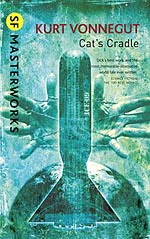 Amazon is offering 18 Kindle edition Kurt Vonnegut titles for $3.99 each through the end of September. The regular list price for these books is up to $15 a piece so you can get three for the price of one. Seems a great time to stock up on some Vonnegut so get ’em while they’re hot!
Amazon is offering 18 Kindle edition Kurt Vonnegut titles for $3.99 each through the end of September. The regular list price for these books is up to $15 a piece so you can get three for the price of one. Seems a great time to stock up on some Vonnegut so get ’em while they’re hot!
This is also perfect timing for Banned Books Week starting on the 24th. Three of Vonnegut’s books are on our Banned Science Fiction & Fantasy Books list: Cat’s Cradle, Welcome to the Monkey House and Slaughter-House Five. You may remember back in July how Slaughter-House Five was banned yet again.
Obama Reads Brave New World
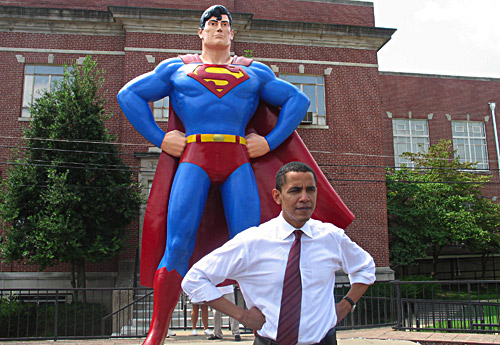 We all know that President Obama is a nerd. After all, he grew up watching Star Trek, knows how to give a Vulcan salute, and once claimed to be from Krypton. Now, however, we have evidence that he’s reading at least one book from the WWEnd database. According to the LA Times, Aldous Huxley‘s classic Brave New World is on his summer reading list. He’s also apparently letting 13-year old Malia read it, since it is on her school’s required reading list (despite being one of the 10 most banned books in US schools). That’s one book marked "read" on BookTrackr™ for the Commander in Chief. What SF/F book do you think the President should read next?
We all know that President Obama is a nerd. After all, he grew up watching Star Trek, knows how to give a Vulcan salute, and once claimed to be from Krypton. Now, however, we have evidence that he’s reading at least one book from the WWEnd database. According to the LA Times, Aldous Huxley‘s classic Brave New World is on his summer reading list. He’s also apparently letting 13-year old Malia read it, since it is on her school’s required reading list (despite being one of the 10 most banned books in US schools). That’s one book marked "read" on BookTrackr™ for the Commander in Chief. What SF/F book do you think the President should read next?
Mistressworks Project
You may remember a few months back we posted a new list of books called the SF Mistressworks to WWEnd. The list is an effort by Ian Sales to bring to light some excellent science fiction books by women authors that have not gotten the attention they deserve. Certainly not as much as books by their male conterparts.
The list has proven to be very popular here at WWEnd and elsewhere on the internets and now Ian is back to up the ante with a new blog dedicated to women SF authors called the SF Mistressworks Blog:
"…I’ve set up the SF Mistressworks blog. Which will comprise reviews of classic and twentieth century science fiction by women writers. It will offset all those “classic sf” and “50 sf novels you must read” and “best sf novels” lists you see all over the internet which have few or no women writers on them. It will demonstrate that women have been writing sf since the genre’s beginnings, and that many of their books are as good as, if not better, than many sf “classics”."
The Mistressworks list is intended to be part of the conversation about women sf writers – not to direct it – so the site won’t be limited to just books from the list. In addition, the blog is a real community effort. So far, Ian has gotten over a dozen volunteer reviewers and has posted 14 reviews with many more waiting in the wings.
Definitely a site worth following. Check it out and let us know what you think of the effort.
The History of Science Fiction
Do you remember that kick-ass History of Science Fiction info graphic we reported on back in March? Well, it’s finally available for purchase as a poster-size (39.5" x 29.5") photo lithographic print. It’s been updated and some spelling errors have been corrected and you can get yours for $26.95 – that’s with 20% off if you order by June 15. I’ve already put in my order and I can’t wait to get it. I’ve got a spot picked out for it at the office. Schweet.
Fire or Ice?
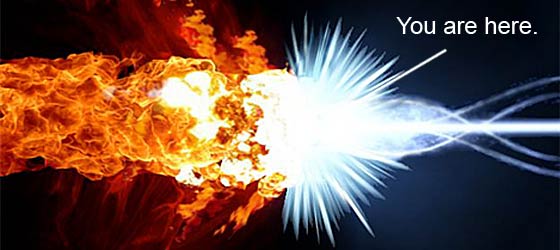
Some say the world will end in fire,
Some say in ice.
From what I’ve tasted of desire
I hold with those who favor fire.
But if it had to perish twice,
I think I know enough of hate
To say that for destruction ice
Is also great,
And would suffice.
– Robert Frost
As you may or may not know by now, today is the last day…. ever. At least, that’s what Harold Camping and the Family Radio network have been preaching since the last armaggedon failed to appear in 1994. Since this may be our final blog post on this earth, we thought it might be a good time to remember other predictions of our impending doom. Perhaps we can finally settle the question posed by the good Robert Frost a mere 88 years ago. Will the world end in fire or ice?
First up: Walter Miller. His Hugo winning novel A Canticle for Leibowitz is a personal favorite of mine (as you can tell from my avatar). In it, the world undergoes a nuclear holocaust, plunging humanity back into the dark ages where the only shreds of written knowledge are preserved by ascetic monks in the southwestern deserts of North America. 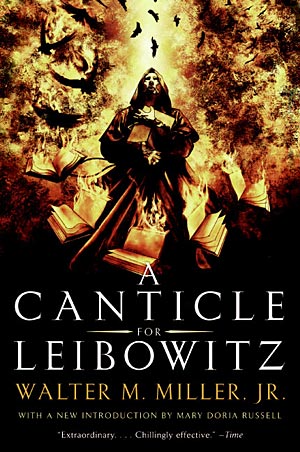 This classic features not one but two armageddons, illustrating the futility of technological conflict. He wrote the book as a sort of penance for his involvement in the destruction of Montecassino during World War II. The event left such a scar on his psyche that only beating out this masterpiece could quell it. Miller’s vote: FIRE.
This classic features not one but two armageddons, illustrating the futility of technological conflict. He wrote the book as a sort of penance for his involvement in the destruction of Montecassino during World War II. The event left such a scar on his psyche that only beating out this masterpiece could quell it. Miller’s vote: FIRE.
Jack Vance invented the “Dying Earth” sub-genre with his novel, The Dying Earth. Unrecognized in his time, the trendsetting novel has been named one of The Classics of Science Fiction and is included in the Fantasy Masterworks list by the Orion Publishing Group. This Earth of the distant future revolves around a red giant that is inexorably dying out. Like the sun, the human race is also a dim reflection of its former self, relying on the remnants of forgotten technology and magic. 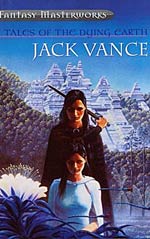 Vance was known for the mixing of science fiction and fantasy, and the trope of a massive but cooling sun dominating a now red sky provides a fantastic backdrop for both genres. Though the planet is not quite destroyed in this 1960’s series, its inevitable fate is known. Jack Vance votes ICE. (P.S.: I’ve always wondered whether Jack Vance was the inspiration for Vance Refrigeration in The Office.)
Vance was known for the mixing of science fiction and fantasy, and the trope of a massive but cooling sun dominating a now red sky provides a fantastic backdrop for both genres. Though the planet is not quite destroyed in this 1960’s series, its inevitable fate is known. Jack Vance votes ICE. (P.S.: I’ve always wondered whether Jack Vance was the inspiration for Vance Refrigeration in The Office.)
Rarely do we get to see the Earth actually die in a science fiction novel. Sure, it might sustain a few nuclear wars or a couple of extinction events, but it’s hard to continue a story when all of your characters are dead. You can imagine my delight, then, when I re-read H.G. Wells‘ The Time Machine. Sure, everyone rememebers the Morlocks and the Eloi. You might still have a few whispy dreams of the lovely Weena, the Time Travellers demure girlfriend from the year 802,701 A.D. What I forgot, however, was the protagonists final trip to the ends of the Earth (literally). For those who are a little foggy on the details, we’ll fill you in. After rescuing his shorty, the Time Traveller travels another 30 million years into the future, where he witnesses crabs and butterflies sparsely inhabiting blood-red world of simple vegetation. A few jumps later gives us the answer we seek: the Earth’s rotation stops and the sun shrinks away until the earth and everything in it sets in for a deep freeze. For Mr. Wells, that’s a definite ICE.
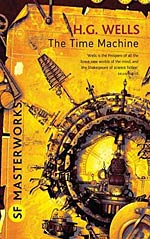
A few other WWEnd author votes include:
Gene Wolfe votes ICE with his classic series, The Book of the New Sun, which describes an “Urth” in a distant future whose sun is dying.
The great Larry Niven begs FIRE in a big way with Lucifer’s Hammer, where the planet gets smacked with a (near) extinction event in the form of an asteroid.
If you want a definitive answer to the way the world ends, you can’t get any closer than This is the way the World Ends, by James Morrow. He nabbed nominations for both the Nebula and Campbell awards, casting his vote for FIRE by way of a nuclear war.
This leaves us with a tie of 3-3, but what do I know? I just picked six books at random. Please add to the list by citing your favorite WWEnd authors, or even authors not yet in our database. Hell, cast your own vote. We just need to break this tie. Please hurry, though. We only have until 6PM before the latest scheduled apocalypse.



















 Full Details
Full Details
